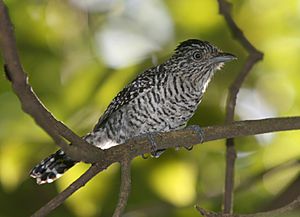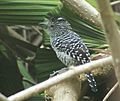Barred Antshrike facts for kids
Quick facts for kids Barred antshrike |
|
|---|---|
 |
|
| Male in Goiás, Brazil | |
| Conservation status | |
| Scientific classification |
|
| Kingdom: | Animalia |
| Phylum: | Chordata |
| Class: | Aves |
| Order: | Passeriformes |
| Family: | Thamnophilidae |
| Genus: | Thamnophilus |
| Species: |
T. doliatus
|
| Binomial name | |
| Thamnophilus doliatus (Linnaeus, 1764)
|
|
| Script error: The function "autoWithCaption" does not exist. | |
| Synonyms | |
|
Lanius doliatus Linnaeus, 1764 |
|
Script error: No such module "Check for conflicting parameters".
The barred antshrike (scientific name: Thamnophilus doliatus) is a type of passerine bird. It belongs to the antbird family. You can find this bird in many parts of the Neotropics. This includes places from Tamaulipas, Mexico, all the way through Central America. It also lives in Trinidad and Tobago and a big part of South America. Its home in South America is east of the Andes mountains. It goes as far south as northern Argentina, Bolivia, and Paraguay. There has even been one sighting in southern Texas!
Contents
About the Barred Antshrike
The barred antshrike is known for its unique look. Males and females have different patterns. This is called sexual dimorphism. Males have a cool black and white striped pattern. Females have more of a reddish-brown color. Both have a strong, hooked bill. This bill helps them catch insects.
Where They Live
These birds live in many different habitats. They prefer places with dense bushes and trees. You can find them in forests, woodlands, and even gardens. They like areas with lots of cover. This helps them hide from predators. They are often seen in the lower and middle parts of trees.
What They Eat
Barred antshrikes mainly eat insects. They are very good at finding them. They search through leaves and branches for their prey. Sometimes, they might also eat small spiders or other tiny creatures. Their diet helps control insect populations in their habitat.
Their Amazing Calls
These birds are very chatty! The barred antshrike has many different songs and calls. They use these sounds to talk to each other. They might make crow-like cawing sounds. These sound like "arrrr." They also have a slow "hoo-hoo" call. These calls help them communicate. They use them to find mates or warn others about danger.
Images for kids
-
Female, Brazil
-
Male T. d. tobagensis, Tobago
-
Female T. d. tobagensis, Tobago
-
Male, Henri Pittier National Park, Venezuela
See also
 In Spanish: Batará barrado para niños
In Spanish: Batará barrado para niños
 | Percy Lavon Julian |
 | Katherine Johnson |
 | George Washington Carver |
 | Annie Easley |








